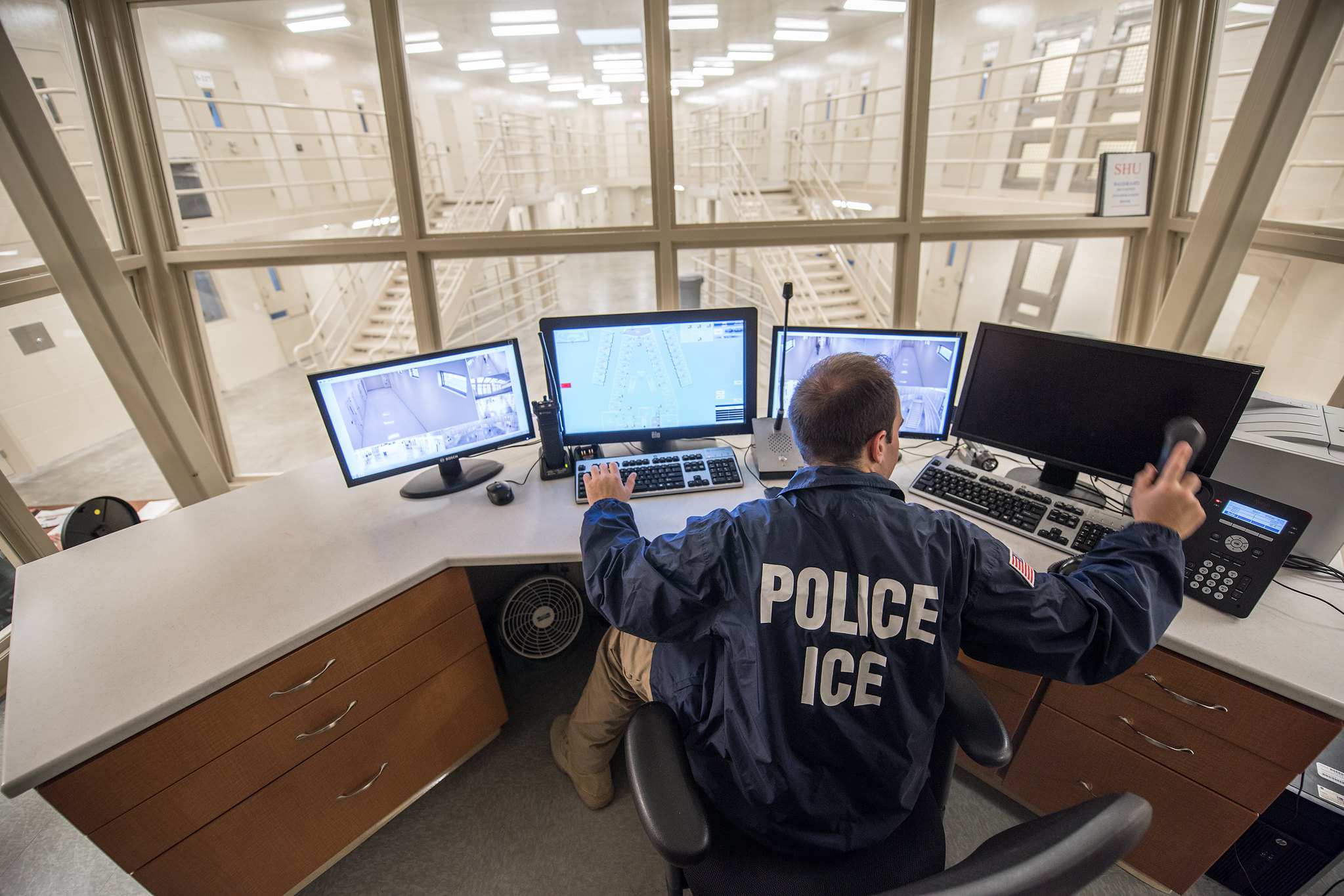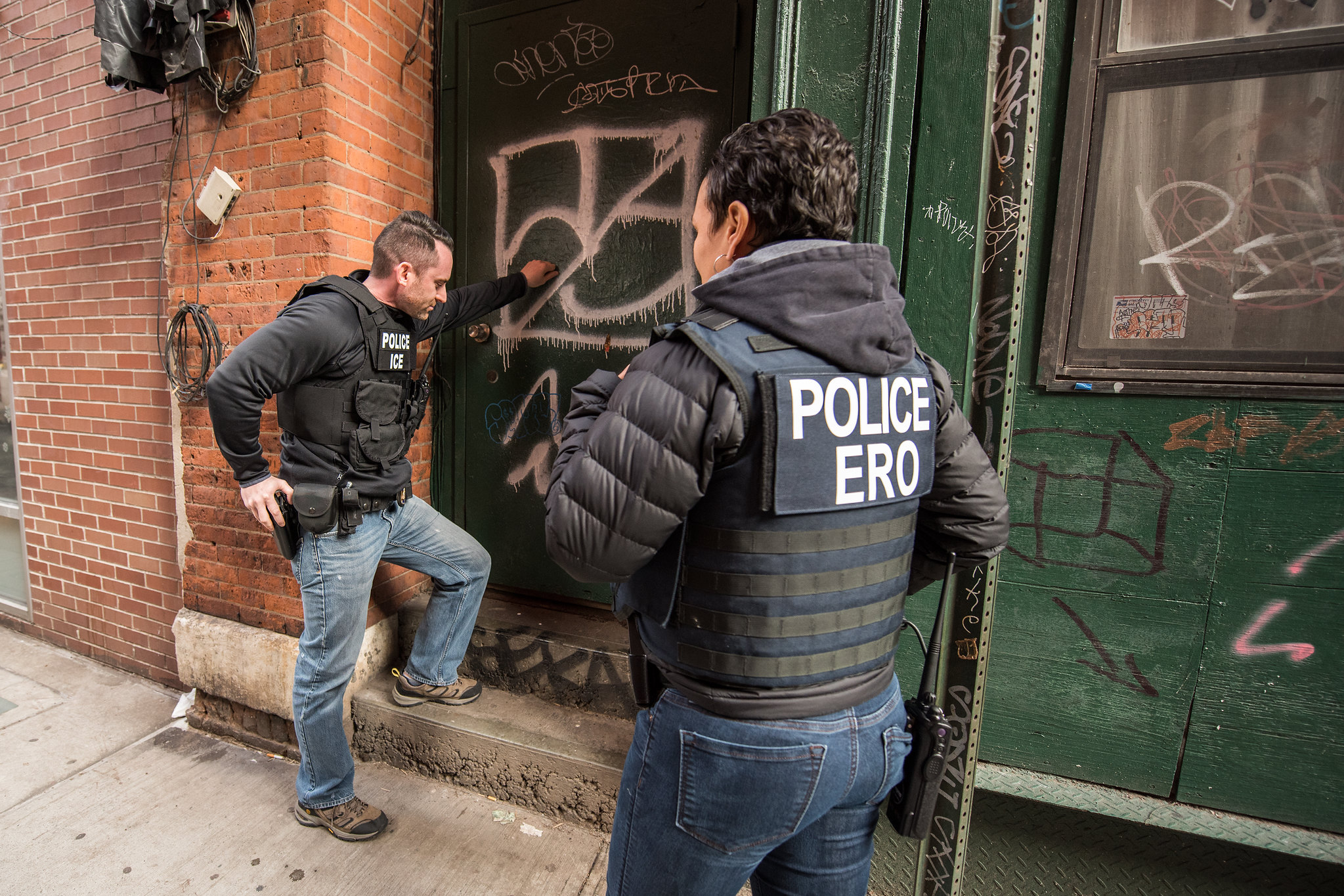Jose Martin Hercules Aleman had to show up to immigration court alone, twice. He remembers feeling fearful, appearing in front of a judge without any legal representation by his side for two removal hearings, once in mid-March and again in April.
“It’s really scary because you don’t know what you should respond,” Hercules Aleman, 36, said in a phone interview from detention. “You don’t know anything.”
Hercules Aleman, who is from El Salvador, has been in U.S. Immigration and Customs Enforcement detention at the Moshannon Valley Processing Center in Philipsburg, Pennsylvania for about four months.
What Hercules Aleman didn’t know when he arrived was that there was a network of state-funded New Jersey immigration legal providers searching through every avenue they could to find people like him to represent.
He lived in New Jersey before being picked up by ICE and taken out of state, so he qualifies for a state-funded program that represents immigrants in detention or deportation proceedings.
ICE is moving New Jersey immigrants like Hercules Aleman – who face charges in criminal or family court – to out-of-state immigration detention facilities. But the agency is usually not notifying the group of immigration legal providers funded by the state to represent these detained immigrants.
Also Read: Settlement Forces ICE to Justify Detaining Immigrants with Disabilities
The situation also makes it challenging for immigrants to resolve their charges in criminal or family court from outside of New Jersey, advocates say, and even to access public defenders. Without resolving other charges, immigrants are more likely to be denied immigration relief and released on bond, limiting the possibility for them to travel to New Jersey to deal with their other cases.
In immigration court, the presumption of innocence doesn’t apply. Priscila Abraham, a Detention Fellow with the Rutgers Immigrant Rights Clinic, said that ICE and immigration courts do not look “favorably” on an individual who has pending criminal cases. “So we’re kind of caught in this [catch] 22 where we’re trying to resolve these cases without ICE cooperating with us,” Abraham said.
So if an immigrant goes into ICE custody with criminal charges pending, said Susannah Volpe, an assistant deputy public defender at the New Jersey Office of the Public Defender, “you have a really hard time proving that you’re not a danger to other people in the community, because those charges can be assessed in sort of the totality of the evidence–even though in the criminal case, you’re innocent until proven guilty.”
Immigrant advocates and elected officials have asked ICE to provide more information about individuals the agency is moving to out-of-state facilities. But ICE has repeatedly denied these requests, according to emails from immigration legal providers and an ICE official, and people familiar with these communications.
In its policy on transfers, ICE says it is not required to notify family members “or other third parties” of a transfer. If a detained immigrant has an attorney registered with the court, ICE will notify the attorney, the policy says. But many of the individuals taken out of New Jersey do not yet have an immigration attorney on record, advocates said, so it becomes difficult to locate those who need representation.
“These are our New Jersey community members and residents, and they might not know about us until it’s too late,” said Raquiba Huq, the Chief Attorney for the Immigration Representation Project at the Legal Services of New Jersey (LSNJ).
Emilio Dabul, a spokesperson for ICE, said that the agency adheres to its transfer policy, and takes into consideration “immediate family, attorney of record, and status of removal proceedings.”
“Due to operational security, ICE does not announce and/or discuss projected transportation operations,” Dabul said.
Hercules Aleman had been living in New Jersey since 2008, he said, and was detained by ICE in early March after he faced criminal charges of simple assault and violation of a domestic violence restraining order, according to Department of Homeland Security (DHS) documents and New Jersey court documents his immigration attorney shared with Documented. The attorney said the charges were related to a fight with his landlord.
Also Read: New York Immigration Court Backlog Reaches Historic High
The charges were downgraded and transferred to family court.
Hercules Aleman was convicted of a separate simple assault charge in 2019, and sentenced to a year of probation, including an anger management program, according to court documents.
He has also faced a list of other criminal charges in the past — involving simple assault, criminal mischief, and theft — which were dismissed, according to the DHS documents. In 2016, he was also arrested by the Woodbrige, New Jersey police department for assault by auto, though there is no disposition for the charge, according to DHS documents.
Once ICE moved Hercules Aleman to detention in Pennsylvania, it created additional barriers for him to resolve these separate cases. He likely spent extra time in detention than necessary because he could not find the New Jersey pro-bono representation program until a month and a half in, his attorney said, and showed up to immigration court removal dates alone.
He still has not been able to access a lawyer for his case in family court, and was denied immigration bond at a May 25th bond hearing while his other charges were still pending, according to his attorney.
Hercules Aleman said when he was taken into immigration detention in early March, he was given a sheet of paper that listed attorneys, but none of them answered his calls. Eventually, a friend inside the detention center who lived in New Jersey shared the number for the American Friends Service Committee (AFSC), a group that provides pro-bono legal representation for New Jersey immigrants, he said.
Now, Hercules Aleman is giving the AFSC hotline number to others in detention, where he said many people are struggling to find attorneys. “For all the new people who are arriving here, the situation is frustrating,” he said. “The days and the weeks pass, and the lawyers that [ICE] give you don’t answer. And then from there you start asking friends if they know any lawyers.”
Last year, after a lengthy push by advocates and elected leaders in New Jersey, county jails stopped holding detained immigrants for ICE. Since then, ICE has been transporting New Jersey residents to detention facilities out of state. In August of 2021, New Jersey Gov. Phil Murphy signed a bill that would prevent new or renewed contracts for immigration detention in the state.
The Elizabeth Detention Center is the only immigration detention center that remains in New Jersey. It is a privately-owned facility which mostly holds migrants who have recently crossed through the southern border.
New Jersey residents are usually only processed there briefly before being moved out of state, immigration legal providers said. Many immigrants, like Hercules Aleman, are now being detained at the Moshannon facility, hundreds of miles away from their New Jersey homes, according to various legal providers, cutting off their access to resolve charges in criminal or family court in-person, and making it challenging to connect with immigration groups that are state-funded to represent them.
“ICE understands that detainees may have ties to the community and a support network near the location that they are detained,” said Dabul, the ICE spokesperson. “ICE takes that into account when moving to a new facility to keep them as close as possible to their support network.”
Before three county jails shut their doors to ICE last year, the agency shared information with specific legal providers about the immigrants who were arriving in detention at the Hudson County jail, and the Essex County jail more recently, allowing these attorneys to locate people they were funded to represent, said Huq, of LSNJ. This information included lists of names and A-numbers, or partial A-numbers, which the government assigns to every person in immigration proceedings, and providers can use to locate immigrants in detention.
LSNJ is part of a coalition of four groups that have been allocated money in the New Jersey Governor’s budget since 2018 to provide immigration legal services for state residents facing detention, deportation, or both. The coalition is called the Detention and Deportation Defense Initiative (DDDI), and includes LSNJ, AFSC, the Rutgers Immigrant Justice Clinic and the Seton Hall Law School Immigrants’ Rights/International Human Rights Clinic.
But now, providers say that ICE has largely stopped providing the information that they used to locate potential clients, ever since the county jails stopped holding detained immigrants. The agency still gives attorneys information about immigrants who are staying long-term at Elizabeth Detention Center, but that group does not usually include New Jersey residents, Huq said.
Also Read: ICE Denies Release Requests, Sending Detained Immigrants Across the Country
Funds have been specifically allocated in the state budget for DDDI providers to represent immigrants in deportation proceedings. But providers are still receiving this money to represent detained immigrants who they now may not be able to find.
“We don’t know how big the scope of the problem is, because we have no official way of knowing how many people they’re detaining out of state,” said Jordan Weiner, Hercules Aleman’s attorney at AFSC.
Last year, shortly after Essex and Bergen stopped holding people in ICE detention, LSNJ had heard “informally” that about ten people a week were being apprehended by ICE in New Jersey, Huq said, and sent to detention out of state. But the group has not received any updated information since then.
Detained NJ residents could show up to court alone, advocates say
Without an official notification system from ICE, immigration legal groups have looked to other ways to try and find detained individuals they could represent, including communicating with the New Jersey Department of Corrections and the New Jersey Office of the Public Defender. This way, the providers are sometimes able to find out about individuals who are in criminal custody and might be released, only to be picked up by ICE, said Leena Khandwala, the Managing Attorney at the Rutgers Immigrant Rights Clinic, which is part of DDDI.
Advocates are concerned that too many immigrants are in the same situation as Hercules Aleman: unable to immediately access legal representation to which they’re entitled to through the state budget, because ICE has moved them out of state. Advocates are worried that this is happening frequently, potentially hurting the chances that immigrant New Jersey residents may have for release from detention, and immigration relief.
Detained immigrants with attorneys were twice as likely as those without attorneys to get immigration relief, according to a 2016 report from American Immigration Counsel. Those with lawyers were also four times as likely to be released from detention at a custody hearing, the report found.
In the first year of DDDI program in New Jersey, “detained immigrants represented by a state-funded attorney were three times more likely to win release than those who went unrepresented,” according to the American Civil Liberties Union of New Jersey.
At these first hearings, individuals can submit pleas and are advised of their right to find an attorney.
“If we had gotten in touch with them earlier, we might have been able to take on their case,” said Abraham, from the Rutgers Immigrant Rights Clinic.
Weiner, Hercules Aleman’s attorney through AFSC, said that his application for asylum could have been submitted earlier had he had counsel for his removal case. Now, he will have to wait until August 11 for his individual hearing date, even though he was first detained in early March.
ICE denies requests to share additional information about transfers
In March, Senator Cory Booker wrote a letter to the acting ICE Director Tae D. Johnson asking the agency to “carefully review” the request from DDDI providers who asked for identifying information of people transferred out of New Jersey so they could represent them, according to a copy of the letter.
Sen. Booker wrote that when his office spoke about the request with ICE’s Newark Field Office, they were told that it ICE is “‘legally’ unable to provide the DDDI attorneys with the names and A-numbers of the transferred detainees.”
“When pressed for a fuller understanding of the legal impediments as to why this information cannot be shared, none was provided,” Senator Booker said in the letter.
If the request from DDDI providers to “regularly receive a list of the names and A-numbers” of detained immigrants transferred out of state is denied, Senator. Booker wrote, “I request a detailed explanation of the basis for the decision, including citations to the laws and regulations at issue.”
Also Read: ICE is Leaving Asylum Seekers at a Remote Bus Station in New York
ICE responded to the Senator’s letter in early June, according to an official from Senator Booker’s office familiar with the correspondence.
In its response, the agency said it can only share the names and lists of transfers for people who already have an attorney of record, the official said, and that sharing this information was not aligned with ICE policy.
ICE also said that individuals were held for no longer than 72 hours at the Elizabeth Detention Center, and that people who are transferred are given a list of immigration legal providers to contact, according to the official.
Dabul, the ICE spokesperson, said: “ICE responds to Congressional correspondence through official channels and by appropriate officials at the agency.”
“Without a lawyer, people appearing in immigration court are more likely to be deported, returning to countries where they may face persecution, torture, and long-term separation from their children and families,” Senator Booker said in a statement to Documented. “My office will continue to work with ICE to ensure New Jersey residents in ICE custody have immediate access to legal representation, even as they are transferred out of state, so they can receive a hearing.”
New Jersey providers say they’ve been trying to contact ICE about the issue since last year. “We’ve made formal requests for these names in so many contexts,” said Khandwala, including through congressional representatives and directly in several meetings with ICE.
LSNJ has asked ICE various times to provide lists with a centralized source of information, Huq said. “They’ve declined to give us those lists,” she said.
The American Friends Service Committee (AFSC), too, has encountered these barriers.
“ICE won’t give us the information of where it’s transferring people,” said Weiner, Hercules Aleman’s attorney .
In October, ICE responded to a request from DDDI for ICE to provide them access to people held at Elizabeth Detention Center briefly before they were transferred out of state, according to emails of the communications.
The immigration legal providers were told that ICE would not be giving lists of names for those transferred, according to an email an ICE official sent to a DDDI provider.
Meanwhile, Hercules Aleman awaits what he thinks might be a grim outcome–a deportation back home to El Salvador, away from his family. He used to work as a cook at a Chinese restaurant and lived mostly in Edison, New Jersey, sending money home to his mother who relied on his income, he said.
But without immigration bond, which a judge denied, his mother is left without that money. And the distance from detention to his New Jersey home means that on top of the legal problems this causes, his two children, ages eight and ten, cannot travel the approximately 250 miles to the Pennsylvania facility where he’s now detained.
“Little by little, I feel like I’m getting further away [from them],” Hercules Aleman said. “Here, the days feel like they are years.”














